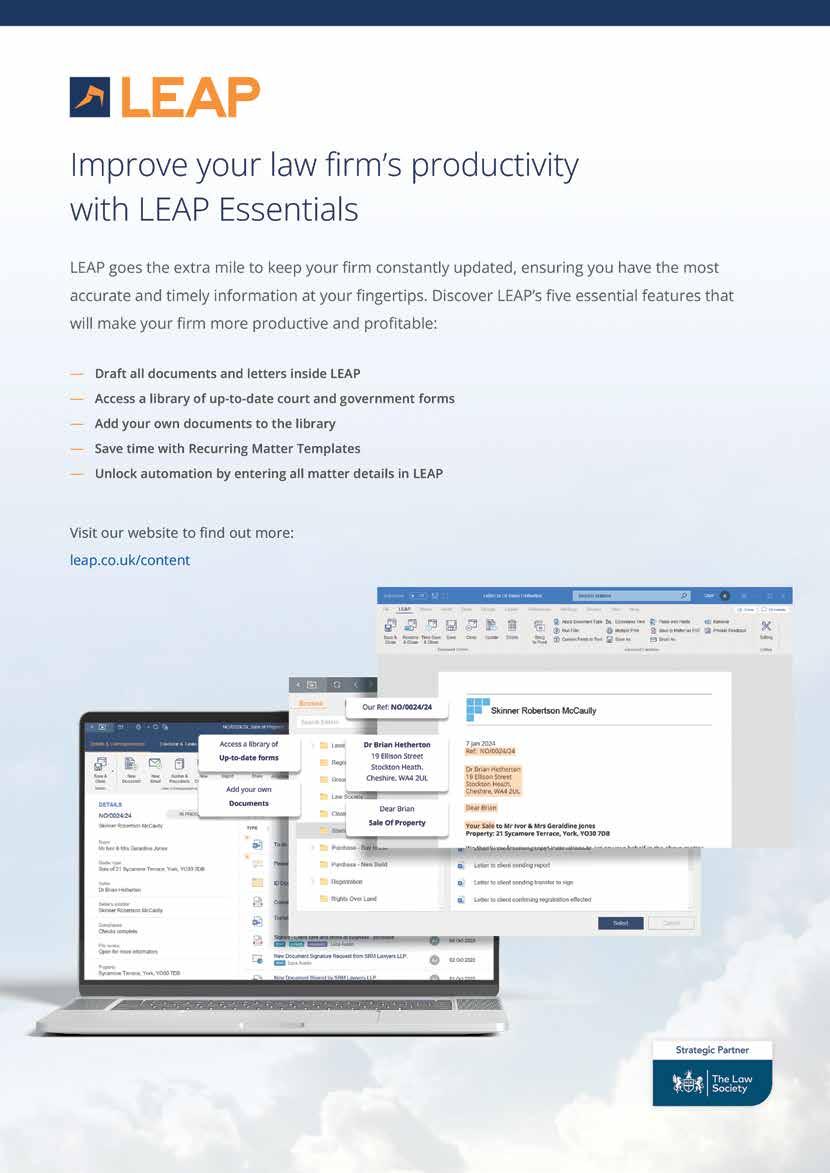










The President’s Annual Dinner took place on Friday 13th October at The Hanger, Milsoms Kesgrave. With a slight change to the usual focus the event was targeted as the President’s Charity Fundraising event of the year with Suffolk Law Centre and Mid and North East Essex Mind as the charities of choice
Guests of the evening were able to purchase raffle tickets for the expansive prize table, generously donated by firms



and businesses near and far, and to try their hand at a silent auction provided by Blue Mondays. There was much fun and dancing the night away to the Three Chordettes until the carriages at midnight.
Speakers for the evening included our President Amanda Timcke, drawing a breath for us all to reflect on our achievements and successes as a profession. Looking externally to the counties in which we operate and internally to the creation and support of diverse, inclusive and equal workforce, celebrating our


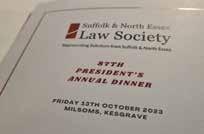

roles and seeking to protect and promote our mental health and wellbeing. Louise Goodenough, the Vice President complemented this theme with her pre-dinner prayer, and we all tucked into a lovely 3 course meal.
Support for the evening was provided by Anglia Research, Estatesearch, Index and Southey & Co.
As a result of all this support SNELS raised in excess of £2,000 on the night for the 2024 President’s Charity Fundraiser. This was a record sum, and we look forward to beating it next year!





President
Amanda Timcke
Birketts
Ipswich
Tel: 01473 406215
Email: amanda-timcke@birketts.co.uk
Vice President
Louise Goodenough
Haywards Solicitors
Stowmarket
Tel: 01449 613631
Fax: 01449 613851
Email: louise.goodenough@haywards-solicitors.co.uk
Deputy Vice President
Benjamin Carver
John Fowlers
Colchester
Tel: 01206 576151
Email: bencarver@johnfowlers.co.uk
Honorary Secretary
Ivana Radovic
Birketts
Ipswich
Tel: 01473 921 716
Email: ivana-radovic@birketts.co.uk
Honorary Treasurer
Louise Cardwell
Ashtons Legal
Tel: 01473 261320
Email: louise.cardwell@ashtonslegal.co.uk
Honorary Council Members
Donna Taylor, Council Member for Suffolk
Nexa Law Limited
London
Tel: 020 7504 7071 – Extension 2127
Mob: 07859 896 640
Email: donna.taylor@nexa.law
Tony Fisher, Council Member for Essex
Fisher Jones Greenwood
Colchester
Tel. 01206 835231
Mob. 07904 086254
Email: tfisher@fjg.co.uk
PRO/PLO
Louise Goodenough
Haywards Solicitors
Stowmarket
Tel: 01449 613631
Fax: 01449 613851
Email: louise.goodenough@haywards-solicitors.co.uk
Education & Training Officer
Amanda Timcke
Birketts
Ipswich
Tel: 01473 406215
Email: amanda-timcke@birketts.co.uk
Greetings and welcome to my final message as your President of SNELS. I have been honoured to represent you and be part of a widening and evolving representative organisation during the last 12 months and to follow this trend of modernisation, I am succeeded by Louise Goodenough, our first President qualified Legal Executive. Another milestone in the SNELS journey.

It has been a packed year, and I still wanted to do more! The inaugural University of Suffolk Legal Advice Centre Annual Lecture started with the magnificent Leady Hale Lecture on 8 November 2023. This was well received and sold out very quickly! So pleased that SNELS was able to support and be part of this (and we got Lady Hale before UEA in Norwich).
I was also honoured to be invited to be a guest to attend the Norfolk and Norwich Law Society’s Excellence Awards and Dinner and build on a number of collaborative initiatives with the Kent Law Society, Cambridge Law Society and Mid Essex Law Society’s this year. My diary has been kept busy and I have continued to grow our membership numbers and volunteer Council members.
It has remained a challenging year for the economy and profession, with some high-profile success stories for The Law Society in protecting access to justice and fighting for a voice for those who need one. Equality and parity in society can only be achieved through collaboration and support of each other, and the Rule of Law is a precious tool that we must protect and promote in this arena.
Wishing you all the best for 2024 and thank you for all your hard work and support.
Amanda Timcke President, Suffolk & North Essex Law Society
Lady Hale, one of the country’s most significant lawyers and first woman Justice of the Supreme Court of the United Kingdom, praised the enthusiasm of law students, staff and the legal community in Suffolk when she addressed them at the University of Suffolk’s first Legal Advice Centre Annual Law Lecture which took place on Wednesday 8 November.
The event, hosted by our Legal Advice Centre in partnership with the Suffolk and North Essex Law Society, marks the first time the University has hosted a dedicated Law Lecture and was a sell-out event attended by the region’s legal community including solicitors,
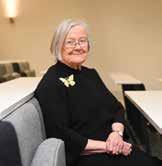
barristers, judges, A level law students, alumni, and current undergraduate law students. Sizewell C sponsored a wine and canape reception after the lecture.
During the event, Lady Hale met some of the current law students who are working with the Legal Advice Centre to find out about their progress and their ambitions for the future.
Lady Hale said: “The University of Suffolk is delivering an innovative and fresh approach to studying law. I have been impressed with what the Legal Advice Centre has achieved – in particular the unique approach to offering legal advice and support to business.”
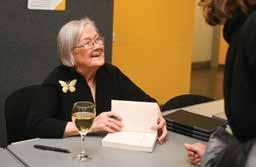

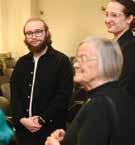



Ipswich:
“It was absolutely terrific. All these wonderfully enthusiastic young people. But not only enthusiastic young people, all the people locally who are here to support those young people in what they’re doing and what they’re going to do.”
Eleanor Scarlett, Director of the University of Suffolk Legal Advice Centre and Senior Lecturer in Law said:
“Our inaugural Law Lecture was a huge success, and we were delighted to welcome Lady Hale to share her experiences from her incredible career. Our students, who will soon be embarking on their own legal careers, were inspired hearing about the significant contribution that Lady Hale has made.”
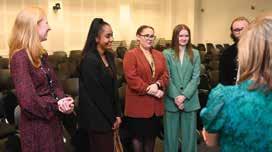

With the first few working weeks of 2024 under your belt how do you feel?
Is 2024 all set to be your best year yet or do you have career frustrations?
It’s a subject that I have written about before, making conscious career choices, as it never goes away. It is all too easy to go with the flow, take the path of least resistance and generally keep everyone around you happy.
However, this can lead to a number of problems. Firstly, you might find yourself down a path that you never even intended to take. You volunteer, or are volunteered, for a type of work/ client and before you know it you are the office ’expert’ on an area not of your choosing.
Secondly, you might find yourself in a state of ‘rust out’, the opposite to burn out. You can do your job standing on your head, with one arm behind your back, you are on auto pilot, and you are not being challenged on a daily, weekly, or even monthly basis.
In both cases you need to take action. Leaving an unsatisfactory situation to linger will make it worse. Your options, and your mindset will become

more entrenched and that might turn to frustration or even anger at colleagues or yourself for not being where you want to be.
Talk to those around you, your line manager, HR. What can be done to change your situation and get your work life back on track for you? Often some small adjustments can make a big difference
Want a certain work type?
Do some focused BD/ marketing work in that area.
Need a new challenge? Take over supervision of a colleague or take responsibility for a new project.
Looking for more work or higher-level work?
Make it your mission to keep in touch with the top clients or referrers from the last 12 months to ensure you are top of mind when they need you again, or so you can get the pick of the work coming through.
In a rut?
Get out of your comfort zone, volunteer for a talk or a project that scares you just a little bit and make it your 2024 mission to shine in a new skill.
Remember that businesses are making choices all the time, they need to adapt and change to market conditions and that makes good business sense to them. If you have discussions and the business needs and your own needs just don’t align, then it’s time to make some conscious choices of your own. Where do you want to be? What elements are missing that need to be filled?

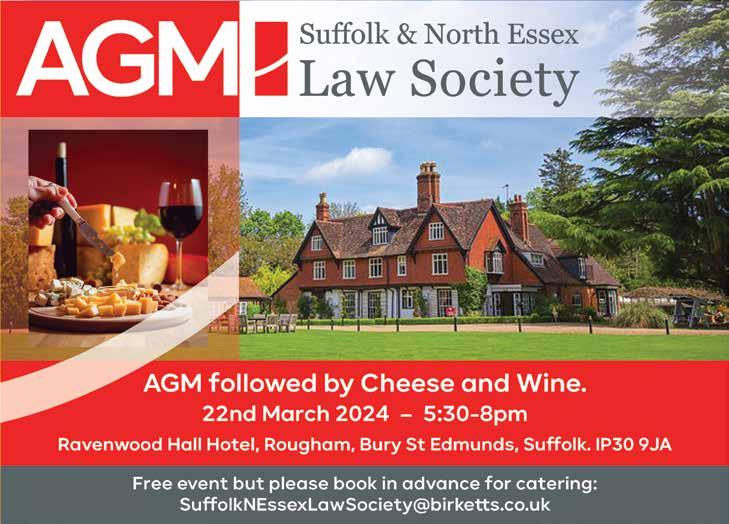


When there is unsafe winter weather there are three reasons to consider having a Live – In Care Package:
• In winter weather hourly, care workers often find it difficult to get to their clients and this is especially true in rural areas.
• For people with high dependency care needs, a live-in care package can be cost effective and safer.
• Able Community Care has been providing live-in care services on a nationwide basis for over forty years.
For further information visit our website at: - www.ablecommunitycare.com
Call 01603 764567 or email to info@ablecommunitycare.com for your information pack.
Visit www.ablecommunitycare.com for an application form.
Able Community Care, Norwich. NR14 8TZ
Providing reliable home care support nationwide
46A St. Matthews Street
Ipswich Suffolk
IP1 3EP
Tel: 01473 408111
web: www.suffolklawcentre.org.uk

Email: office@suffolklawcentre.org.uk
We have just filed our accounts and Annual Return for the year ending 31 March 2023 with the Charity Commission.
You can see it here Accounts and annual returns, SUFFOLK LAW CENTRE - 1176229, Register of Charities - The Charity Commission. It shows that for the second year running our expenditure (£523,504) exceeded our income (£476815) by nearly £50,000.
The last decade has seen a 77% drop in civil legal aid cases started nationally, largely due to cuts to what’s covered by legal aid, but also because the areas left in scope are not financially viable for providers.
The present fee schemes do not reflect the costs of carrying out legal aid work. The Law Society’s 2023 Law Management Section Financial Benchmarking Survey demonstrates that a legal aid provider, would need to see rates of around £80 per hour to break even each year. Currently civil legal aid rates are significantly below this level, the average fee being £45-50 per hour, meaning that, civil legal aid work is unsustainable. We are having to cover the core costs of running our two legal aid contracts, through grant funding and donations, which are getting harder and harder to secure, with a wider cohort of legal advice charities competing nationally for limited funds.
We are working with consultants funded by the Law Society to provide further evidence to the Ministry of Justice of the true costs of providing civil legal aid services.
More positively, December and the New Year brought some much needed brighter financial news. The National Lottery Cost of Living Fund granted us £68,970.00 to help plug the gaping hole in our current unfunded core costs.
We have been awarded 3-year funding by the Legal Education Foundation towards sustaining and strengthening our Housing and Family teams.
Most recently, our application to the Improving Lives Through Advice funding from the Access to Justice Foundation was successful, awarding us just over £80,000 per annum for the next five years.
Whilst we have tightened our belts, and our salaries remain very low, inflation and increased running costs have caused us to eat into precious reserves. Our position leading up to the end of last year felt more precarious than it ever has done since we started in 2018.
We set up Suffolk Law Centre because we know early legal advice plays a vital role in preventing everyday problems from escalating, helping to reduce homelessness, repossession and related mental health issues. Suffolk had become a legal aid desert in housing providers, and, with the consistently high levels of enquiries received by our Family team, we know first-hand how few family firms locally are still taking on legal aided private family work.
Whilst these grants only cover part of our costs, they are both a good contribution towards ensuring our sustainability and also a boost for all our hardworking staff, Trustees and volunteers.
Towards the end of last year, retired solicitor and Deputy Lord Lieutenant of Suffolk, Roger Finbow wrote to all local law firms.
Roger has, over the last few years, taken a special interest in the development and advancement of Suffolk Law Centre, helping us to fund a part-time Solicitor role through donations from individual solicitors, barristers and judges with Suffolk connections who are based in the City or at the London Bench or Bar. But we are still woefully short of experienced legal staff. In particular, a further expert in family law matters is urgently needed to support our small team to better meet growing demand.
We are most fortunate that Mark Pendlington, the current High Sheriff, is a strong supporter of the Centre.
Together, he and Roger have committed to raising the funds for a further lawyer, about £45,000 a year. This is where the law firms of Suffolk and North Essex can play a part – and we hope all will do so, by donating funds.
Greene and Greene have donated the first £1000. We do hope you can match, or even exceed that.
Access to justice is a fundamental right, currently denied to the less advantaged in our communities. We believe you will agree that those of us who are in a better position should not stand by when a philanthropic action could make a significant difference.

In the SRA’s Workplace Culture Review and its follow-up guidance, they set out their expectations on firms to create and maintain the right culture and environment for the delivery of competent and ethical legal services with effective systems, supervision arrangements, processes and controls in place.
This includes taking steps to run businesses in a way that supports wellbeing by minimising the risk of working practices and workplace behaviours leading to poor mental health. A failure to put in place systems that protect employees may lead to an increased risk of breaching your regulatory requirements.
Allocating resources to initiatives that enhance internal culture is not just a compliance measure; it’s a strategic investment in the long-term success of a firm. The legal profession is evolving, and clients are increasingly seeking services from firms that not only demonstrate legal expertise but also uphold high ethical standards and a positive workplace culture. A strong emphasis on ethical behaviour, and diversity and inclusion can enhance a firm’s reputation, attracting top talent and clients who value socially responsible practices.
Additionally, a positive workplace culture can contribute to increased employee engagement, reduced turnover, and better business performance.
The following roadmap is based on the SRA workplace culture review to help ensure your initiatives and culture spend are aligned with their recommendations and expectations.
As a starting point, law firms are encouraged to conduct assessments of their current workplace culture.
Action points:
• Seek employee feedback and engage and involve employees in decisions about their culture
• Surveys are useful tools to spot issues over time
• A wellbeing steering group can help proactively identify concerns. Duties may include assessing sickness absence, attrition, and access to an employment assistance programme
A key issue highlighted in the SRA’s report is the common disconnect between the actions of senior leaders and the culture they promoted. The SRA have made it clear that policies and strategies should be weaved into the fabric of the firm and demonstrated in the everyday behaviours of leaders and managers, not just written in documents or on websites.
• The review highlights the value employees place on day-to-day support from line managers and colleagues in teams and recommends that leaders are given the time and resources to effectively support people on a daily basis
• There is an obligation on managers (for law firm LLPs, this means the partners) to challenge unacceptable or inappropriate behaviour, whether they have directly witnessed the event or been told of it. Action taken does not need to be formal but should be effective. The COLP must also record the incident and the action taken
• Leaders and managers should be trained to recognise the early warning signs of poor mental health and to mindfully engage employees in sensitive conversations
• Another key focus of the review was the role of supervision. It cites that one-to-ones and supervision meetings can manage risks by creating a space for dialogue with employees about their workloads, capacity, and competency
Heavy workloads can also have an impact on working hours and mental health. Having manageable workloads was ranked as mattering the most in terms of a positive culture by survey respondents. It was also acknowledged as being an area that presented a challenge to get right by individuals and firms.
• Consider using capacity systems that consider individual circumstances and wellbeing. The SRA recommend considering the ‘emotional capacity’ of individuals
• Set clear working hours expectations. Of those surveyed in the report, only 17% worked contracted hours, 24% worked significantly more and 30% said don’t expect emails to be answered in OOO hours
• Managers and supervisors should have oversight of workloads so that people do not feel overwhelmed
The report states that targets that prioritise the financial value of employees have been under increasing scrutiny recently. For example, LawCare suggests that this model can have a detrimental effect on the mental health of some employees and fails to recognise and reward other valuable contributions. The Billable hour was the most frequent answer cited when participants were asked about what they would most like to improve. Additionally the second most highly valued aspect of culture was recognising and rewarding individual contributions,



However, only a minority of firms have specific reward and recognition systems in place.
Action points:
•Consider whether your performance management system motivates ethical behaviours and people to do their best
•Supervision and appraisals should include time to discuss performance and other achievements in a timely manner. Include customer satisfaction, leadership qualities, teamwork, personal development, or contributions to allies and networks in appraisals
•Demonstrate you value qualities that benefit your firm culture and wider community
Fair
The review states that firms should act in a way that encourages equality, diversity, and inclusion. Creating an inclusive environment helps people feel that they can be authentically themselves at work and belong to a community. This in turn, means that they are likely to be more engaged and motivated, leading to better outcomes for clients and therefore businesses.
Action points:
•Improve inclusion by bridging the communication divide between senior leaders and employees. For example, one firm surveyed for the report introduced a gender balance programme where male partners are mentored by a female colleague to make sure they are aware of dif ferent perspectives
•Ensure senior leaders are proactively involved in diversity and inclusion initiatives
•Networks help people to connect with each other to discuss shared experiences
Bullying, harassment and victimisation
21.8% participants surveyed for the review said they had been subject to bullying, harassment or discrimination in the workplace.
According to the SRA “Firms should do everything they reasonably can to look after the wellbeing of those who work in and with the firm. And protect them from bullying, harassment, discrimination and victimisation, while supporting them so they can work safely and effectively.”
Action points:
•The SRA recommends putting in place and implementing policies on bullying, harassment, discrimination and victimisation as well as disciplinary procedures for breach of those policies


•Providing a safe environment for people to raise concerns and addressing them promptly and in a constructive manner. Firms should also be aware that that poor performance by an individual could be a warning sign that an individual is working under stress or duress
•It specified the obligation on managers of firms to challenge behaviour that does not meet this standard
Enforcement strategy
The SRA say they will hold individuals and firms to account for serious failures to meet their standards in accordance with their Enforcement Strategy. As the strategy makes clear, they will focus on breaches that are particularly serious in isolation. Or which demonstrate a persistent failure to comply or a concerning pattern of behaviour.
Action points:
•Minimise the risk of unacceptable behaviour and breaches by having effective systems and controls in place, including some of the examples already mentioned
•Be able to demonstrate proactive action taken to reduce risk and promote a positive workplace culture
•Establish clear and accessible reporting pathways
•Ensure action is taken on complaints. It does not need to be formal but should be effective
•Record details and actions taken
Conclusion
As law firms navigate the changing landscape of the legal industry, the prioritisation of culture initiatives is expected to become a cornerstone of successful and reputable legal practices. By aligning with the SRA’s guidelines, law firms can not only meet regulatory expectations but also foster a workplace culture that attracts top talent, retains clients, and upholds the integrity of the legal profession. To find out more about the SRA-informed training programmes offered by Leading Minds, you can contact them on:
info@leadingmindsglobal.com
 Author: Marie Dillon, Director
Author: Marie Dillon, Director
•
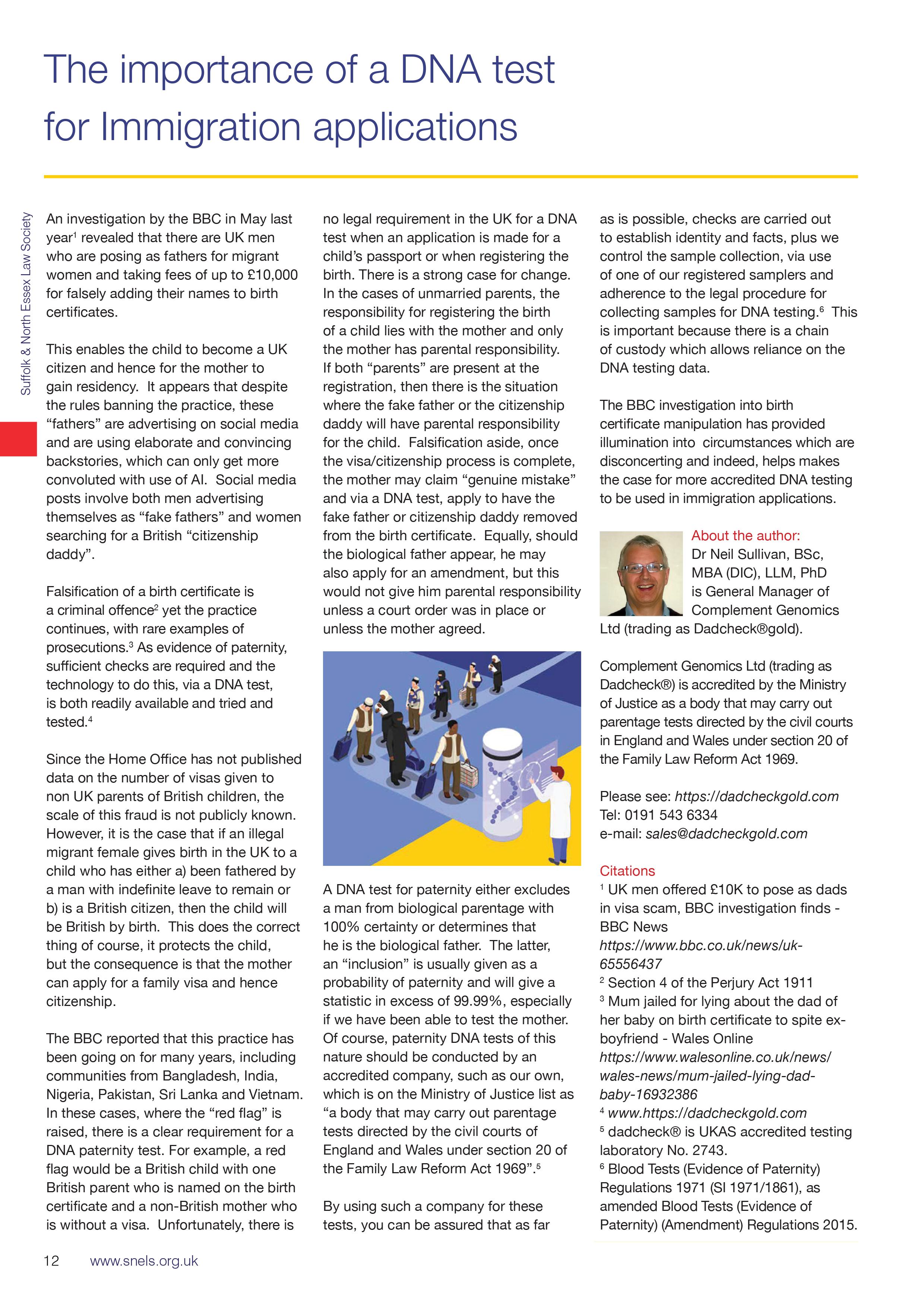


University of Suffolk’s first Legal Advice Centre Annual Law Lecture which took place on Wednesday 8th November 2023.
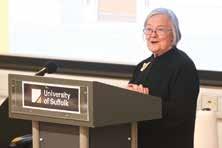


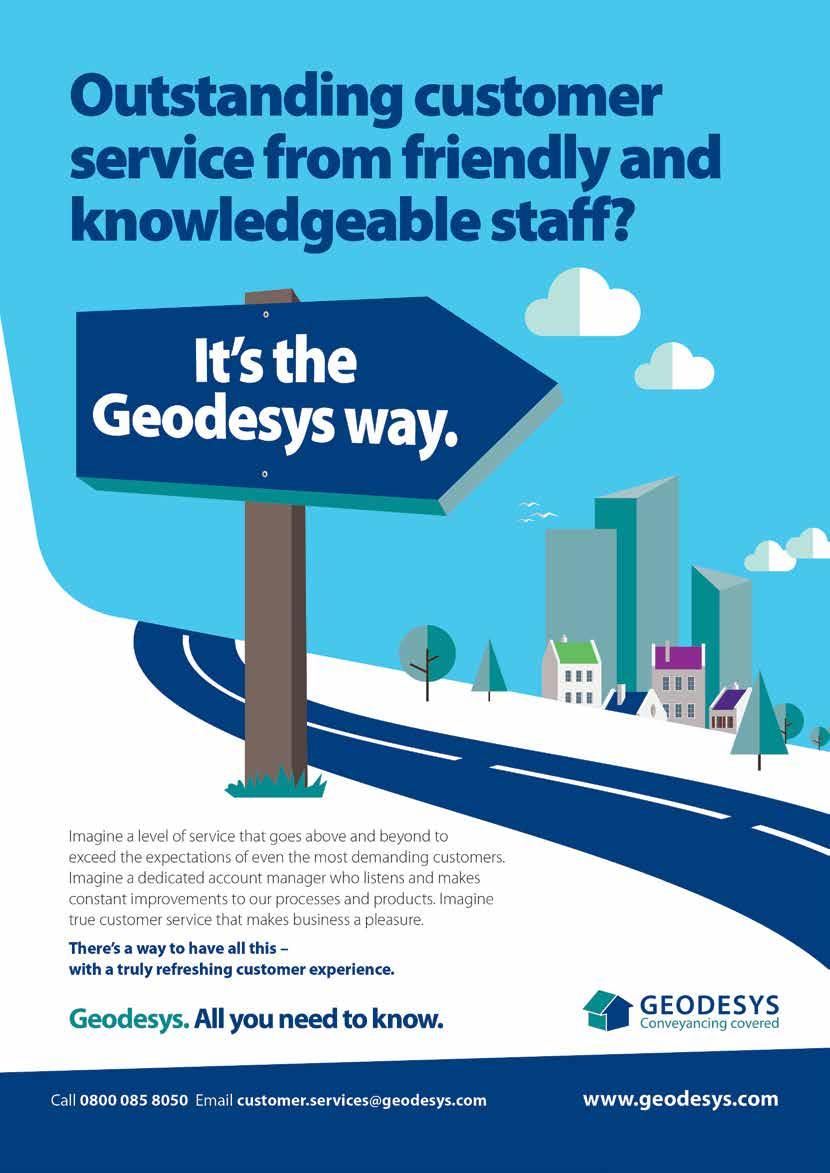

Personal relationships are still the heartbeat of business success, despite the increasing use of technology. Personal relationships convey how we value one another. Personal relationships enable us to have empathy with one another’s situations.
In his seminal book, “How to win friends and influence people,” Dale Carnegie wrote
If there is any one secret of success, it lies in the ability to get the other person’s point of view and see things from that person’s angle as well as from your own
Business relationships then are as much about understanding the challenges we all face in our daily encounters.
The search industry has seen significant changes in recent years. Massive consolidation has seen so many of the traditional search companies swallowed up into larger corporates. We have to find ways of differentiating our service offerings, building that trust in client relationships, and delivering services which conveyancers feel add value to their business.

Don’t get me wrong, consolidation has brought with it huge advances in technology and customer experience. Gone are the days of endlessly calling suppliers to order reports, collating them manually, printing off reams of paper and hand delivering the search to the office…. and good riddance too! With the exception of local authority searches, most of the reports are now available same day, with many returned in minutes.
The delivery platforms are slicker, smarter, more intuitive and spot potential risks that might need to be accounted for, and errors in search requests. But some of this technological advancement has come at the expense of good, old-fashioned customer service. The personal touch.
Do we rely on technology too much? Are chat bots, apps and portals what our clients really want and need? What happens when things go wrong? People need reassurance, they need to be able to pick up the phone, or send an email, and feel as though somebody is taking a personal interest in resolving their issue rather than “chat” to a faceless bot or send messages via portals.
I recently won back a client from a rival supplier. When I asked what it was that brought them back to us they said that they felt as though they were a number, rather than a client. It was the personal touch that was missing from their communications; they didn’t feel as though they ever spoke to the same person twice. There wasn’t a familiar voice at the end of phone when things went wrong (as things inevitably do in conveyancing!).
In our experience 90% of orders go through with little to no intervention required. But that 10% is where relationships are made and broken. This is where knowledge, experience, and expertise really make a difference. Recognising that the conveyancer is almost certainly under pressure, whether it be from the client, agent or the other side, and being able to take that weight off and deal with the issue through to completion is a critical part of the business relationship.
Whether it’s a query on a report back which requires clarification, or chasing up an expedited service. It’s about trusting that the job is going to get done right, first time.
The challenge when introducing technology is that you take a step back from that personal touch. You risk losing the experience and expertise provided by the people when you are over-reliant on the technology. At Geodesys we have people who have been with us since the start, 25 years (and counting!), no amount of technology will replace their understanding and expertise. They are an integral part of our account management and customer service offering. They know the search industry inside out.
The key is getting the right combination of technology and people.
Going back to Dale Carnegie’s quote; the organisations who can empathise with the clients, and understand how to respond, will be the best at winning friends and influencing others.
Kay Toon Account Manager at Geodesys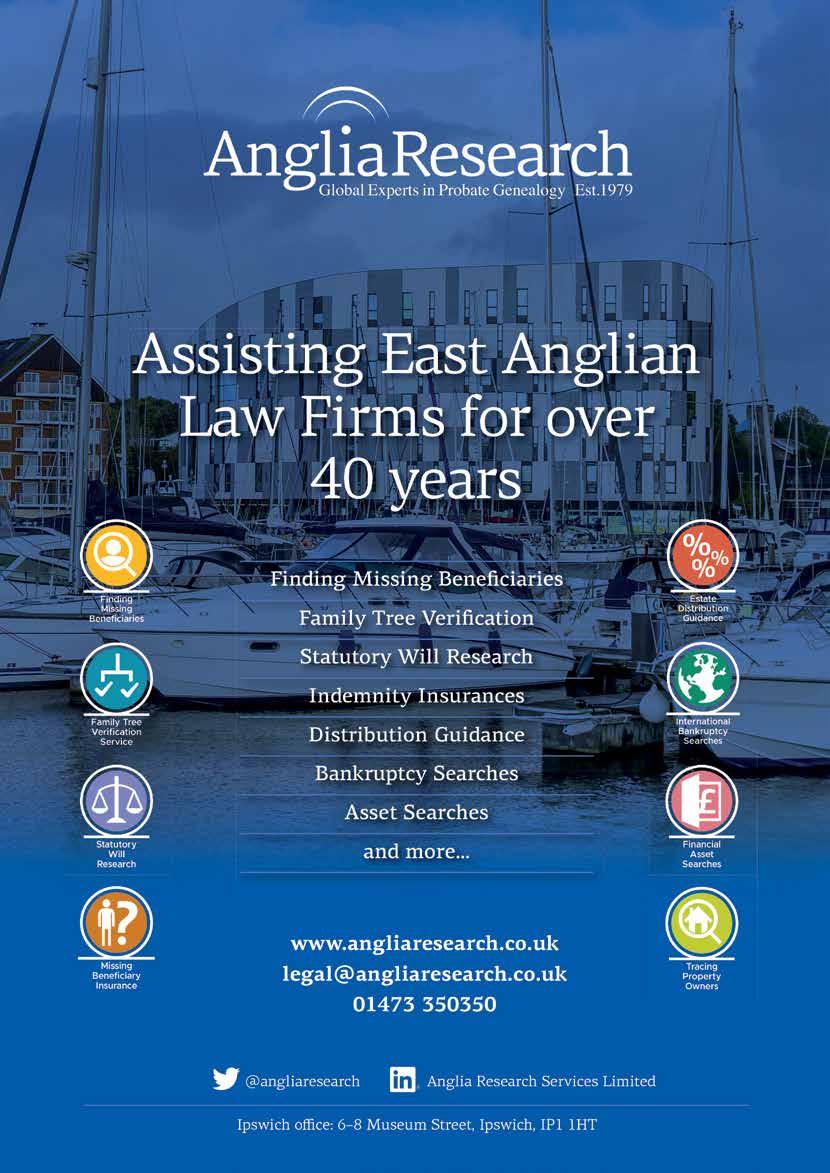

Probate Research is a largely unregulated industry with no barrier to entry. You could, if you wanted, set up your own firm tomorrow quicker than you can say “Who Do You Think You Are?”. No qualifications are required, nor any evidence of relevant training undertaken needed. Which is quite worrying when you think about it.
Contrast this with the life of a legal professional working in a law firm in England. A heavily regulated industry overseen by the Solicitors Regulation Authority. Years and years of high intensity study, followed by further years of gaining hands-on experience. All with a requirement to demonstrate ongoing competence and continuous personal development.
When viewed like this, these two worlds could not be more different, yet they can intersect regularly in the Private client law sector. The danger here is when seeking assistance from a probate genealogist, a legal professional could unknowingly instruct an unqualified novice. If there are any issues, guess who the client is going to blame?
At Anglia Research, we quickly identified the need for some form of regulation for the probate genealogy industry and have been regularly campaigning to help raise standards across the sector which has continued to grow. We are a founding member of the Association of Probate Researchers (APR), the first body to introduce independent regulation to a previously unregulated industry. Both corporate members and individual members abide by the APR’s Professional Standards and Ethics Code.
The PPR acts as both a register and a regulator for professional paralegals and, following an acquisition earlier this year by CILEX, all PPR members automatically became CILEX members.
Anglia Research employs more accredited genealogists, legally qualified and independently regulated staff than any other UK probate research firm. Our accreditation is your guarantee. We have a commitment to our profession - we employ sixteen staff who hold paralegal PPR certificates and in addition have five members of staff who are Association of Genealogists and Researchers in Archives (AGRA) accredited.

Those using the services of APR members, whether legal professional or member of the public, are safe in the knowledge that all members subscribe to our Professional Standards and Ethics Code. Through our case managers’ membership of the Professional Paralegal Register (PPR), there is an independent complaints procedure and compensatory scheme, currently the only professional body for probate researchers that do so.
We believe that this is essential for those that are serious about offering their clients reassurance and protection. For our clients, this means that in addition to the guarantees offered by our own code of conduct, they will have the reassurance of connecting with a culture in which accountability is fundamental.
In addition to this accreditation and qualifications, our Case Managers have a combined total of over 250 years of experience. We know that your best guarantee of a legally sound outcome lies in the calibre of our team. Our investment in accredited staff is your assurance. We believe it is our staff that sets us apart.
Ultimately, we are so focused on case manager training and accreditation because we know how important it is to give comfort to legal professionals using our services. Not every probate genealogy firm has taken this view and thus, not all probate genealogy firms are created equally.
So, overall, it pays to use the services of an experienced, accredited firm that has experienced, qualified employees to undertake the work needed in a professional manner. Do your due diligence. You owe it not just to yourself but also to your clients.

LEAP, the global provider of legal practice management software, and WillSuite, the estate planning innovator, have joined forces to launch LEAP Estates, an end-to-end digital solution for estate management, probate and lifetime planning professionals.
LEAP Estates is a specialist practice productivity solution that equips Private Client practitioners with the tools they need to manage matters on a single platform. Previously, many departments had to use multiple applications for practice management, wills, LPA applications, trusts and probate applications. However, the new solution from LEAP and WillSuite provides a single location for all these functions, improving and simplifying both the practitioner and client experience.
The mission of LEAP Estates is to continually elevate the provision of private client service through innovative technology. Both based in Nottingham and benefiting from the city’s booming technology scene, the two pioneers of legal cloud technology have developed LEAP Estates to support practitioners navigate the changing legal technology landscape. The solution benefits from the shared knowledge, development capabilities and operational resources from both businesses, which is essential in delivering highly effective software with estate management, probate and lifetime planning professionals in mind.
As a specialised division, LEAP Estates offers intuitive information and processes that can be shared with clients, facilitating dynamic and proactive estate planning. LEAP Estates users will also have access to the software provider’s extensive content library, including new recent additions for Private Client practitioners.

We’ve developed LEAP Estates to support Private Client practitioners in meeting the evolving needs of individuals in their lifetime planning.”
LEAP Estates also includes key functionality for will writing, available through WillSuite. This includes mirroring across wills and LPAs, as well as LPA copying. The will writing software provider works in partnership with the Institute of Professional Will Writers and The Society of Will Writers, with over 3,500 wills and 2,500 LPAs drafted on the WillSuite platform each week.

One recent addition to the content library is a document that provides hyperlinks to all the legacy settings on social media. This document is designed to be shared to clients. It offers advice on how to enable legacy settings on platforms like Twitter, Facebook, and Instagram for individuals considering their legacy and making a will.
“Estate planning and Private Client practice probably evolve more rapidly than any other area of law, because it responds to how we live our lives today,” says Craig Matthews, CEO of LEAP Estates. “As a society our attitudes to estate planning are changing, with healthier and younger people considering lifetime planning. Each new generation brings a different asset portfolio, and family structures now vary, impacting wills and probate services. Assets have also evolved, with elements like cryptocurrency, NFTs and digital banking now playing a role.
Seb Shakh, founder and CEO of WillSuite comments, “Since inception in 2015, WillSuite has grown from strength to strength. Our software is now firmly a market-leader, and simplifying the delivery of Private Client work for thousands across the profession is what we do best. This collaboration with LEAP is the next logical step in our journey and pairing our expertise with the world’s largest legal tech platform ensures we can deliver even greater advancements and efficiencies within the sector together through a single integrated solution.”
LEAP Estates can sit within a specialist private firm or a department of a firm. It is also available to accountants offering lifetime planning and probate services, will writers, estate planners and IFAs.
For more information, please visit www.leapestates.co.uk
LawCare, the mental health charity for the legal sector in the UK, has released its 2023 impact report, which shows that mental health struggles continue to be a serious concern.
LawCare has seen an increase in the number of people reaching out for mental health support in 2023, with a sharp rise in people getting in touch because of workplace bullying.
• There was a 14% increase in the number of people contacting LawCare for mental health support.
• There has been a 95% increase in the number of people saying that workplace bullying, harassment, or discrimination was their primary reason for seeking support from LawCare.
Quote from Elizabeth Rimmer, CEO of LawCare:
“2023 was one of our busiest years ever at LawCare, second only to 2020 when the pandemic started.
I would urge individuals and organisations to start taking active steps to create working environments which better protect mental health and where bullying and harassment are not tolerated. We need to drive a collective responsibility in our sector to tackle bullying and harassment by identifying the workplace factors that can lead to it, such as low psychological safety and managers with little or no training and support, and taking positive action to address these.

Let’s talk about bullying and harassment at work webinar LawCare wants to get the legal sector talking about bullying and harassment, and educated about how to tackle it, and is running a free webinar on Thursday 8 February 2024, from 12.30pm to 1.30pm.
LawCare has invited a panel of legal professionals and bullying experts to discuss bullying in the legal workplace and practical strategies for addressing it.

We need to continue to challenge the stigma that prevents many still from speaking up about their mental health and seeking support. Each single act of storytelling, awareness raising, or advocacy contributes to transforming legal culture. You may never know the impact of your voiceyou may give someone the confidence to seek help, provide them with the comfort of feeling less alone, or enable them to speak up too.”
For all media enquiries contact Elizabeth Rimmmer, Chief Executive of LawCare, on erimmer@lawcare.org.uk or 07951 277741
By Elizabeth Rimmer. CEO of LawCare
East Anglian Financial Planning Marks One-Year Anniversary with Remarkable Growth and Award Success.
East Anglian Financial Planning (EAFP) in Langham Colchester, has celebrated its first anniversary, marking a year of significant achievements, growth and noteworthy recognition in the financial industry.
Over the last twelve months EAFP has achieved a great deal, earning the trust and loyalty of valued clients and professional connections along with the commitment of a dedicated team has strengthened the company growth to now nineteen staff, including their five independent financial advisers who have brought to the business a combined industry experience of over 100 years.
Key achievements over the past year:
Remarkable Growth: EAFP has exceeded all expectations and projections in our first year, now managing over £270m of client funds. Matt Merchant, IFA & Director remarked, “it’s been truly humbling how many clients, staff and professional connections have supported us”.
Award-Winning Performances:
EAFP is proud to have received four awards in the past year, securing corporate chartered status, named one of New Model Adviser’s top 100 IFA firms in the country and IFA, Matt Merchant being named New Model Adviser
Next Generation Top 35 under 35. SME Finance awards has just recently awarded EAFP Best Emerging Bespoke Financial Firm - East Anglia Client Service Excellence Award 2023 as well as the company being members of financial vulnerable taskforce.

Looking Ahead:
EAFP is excited about the future. Their strategic vision includes further growth, an even greater local area presence for financial planning across East Anglia and continued support in providing the best customer service to our clients.
Managing Director, Gary Riches remarked “The past year has been an incredible journey for EAFP. We are immensely grateful for the trust our clients have placed in us and the advice and support we have received from our investors. This anniversary is not just a milestone but a testament to the hard work and dedication of our team. We look forward to building on this success and continuing to provide exceptional financial advice”.
For media enquiries, please contact: Marie Rush marie.rush@eafp.co.uk
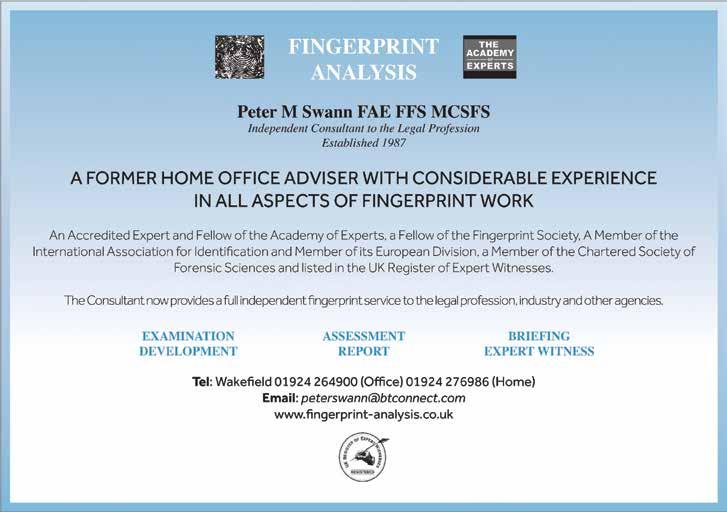
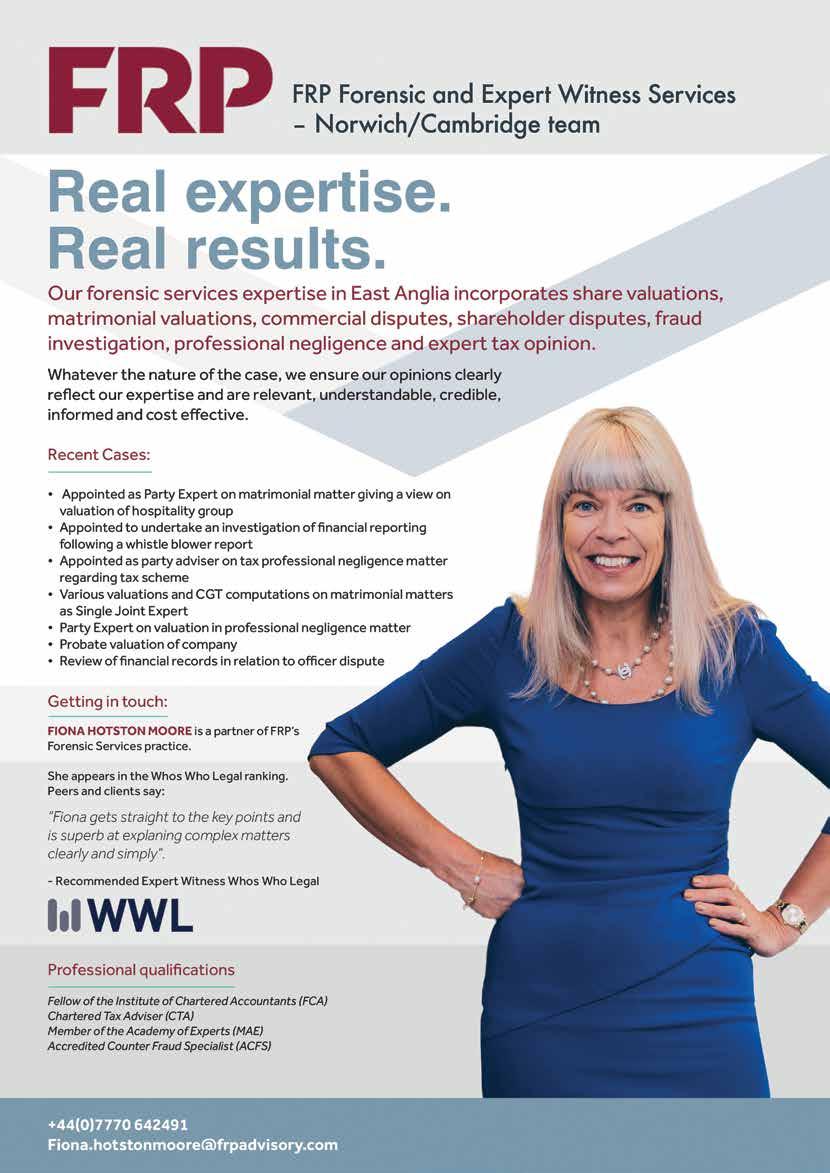
In determining a value of a business, the treatment of goodwill is often an area that can be challenged and is inherently subjective.
Under IFRS 3, Business Combinations, goodwill is an asset representing the future economic benefits arising from other assets acquired in a business combination that are not individually identified and separately recognised. Goodwill is typically described in two forms: personal and corporate.
Broadly if a trading business is valued based on its earnings, goodwill is the value over and above the value of the net assets (after deducting liabilities) on the balance sheet.
Corporate (business) goodwill belongs strictly to the entity itself. It may involve the company’s name, brand, or location for example. Personal goodwill is directly attributable to an individual’s characteristics or attributes, it relates to what the individual personally brings to the company.
Business valuations are typically based on open market value. International Valuation Standards (IVS 104) defines market value as the estimated amount for which an asset or liability should exchange on the date of valuation between a willing buyer and a willing seller in an arm’s length transaction after proper marketing wherein the parties had each acted knowledgeably, prudently and without compulsion.
The application of the idea of a ‘singleton’ business has become more prevalent in recent cases, specifically it was utilised as a key argument in the divorce case CG v SG (2023).
The phrase ‘singleton’ business refers to a business whereby the operations, profit and success of the business is reliant upon one individual. Therefore, the company has high personal goodwill. In general terms corporate goodwill adds more to the overall business valuation
than personal goodwill.
The divorce case (CG v SG) involved a husband’s interest in a financial service limited liability partnership. At the time of the hearing the husband was the sole partner therefore the judge concluded that the LLP was a ‘singleton’ business whereby the operations were dependent on the client relationships of the husband. Moreover, it was highlighted that the husband generated the vast majority of the partnerships fee income and that this was made possible by his business contacts, knowledge and reputation.
In the case of a singleton business, it is assumed that the business could only be sold with the individuals continued involvement. In other words, the goodwill of the business is attached to the individual as a person not the company as an entity. In this case, the goodwill is attached to the husband not the LLP. As the business is solely reliant on an individual, in a real life sale of the business a purchaser of such a professional service business would ensure that any acquisition would be structured such that key fee earners were tied in to enable a continuation of the existing income streams and the transition of personal goodwill to the entity and/or other fee earners.
In this particular case, the judge concluded that in the event of a ‘singleton’ business the key individual could continue to earn a future income from the company however they could also do so without being attached specifically to the company.
Ultimately, it was concluded that no market value can be ascribed to the goodwill in this case as it is not considered that a business exists on a standalone basis. Any future income derived from the business will be a result of the individuals future endeavours and not any separable goodwill or other assets held by the company. The business was valued based on its net assets.
 By Fiona Hotston-Moore FRP Advisory
By Fiona Hotston-Moore FRP Advisory
In my opinion, the application of a ‘singleton’ business could become more prevalent leading to issues in relation to business valuation for divorces. CS v SG offers a good example of the significant effect on company value due to the reliance of a spouse’s ongoing involvement.
In one of the Expert reports the LLP was valued using the earnings-based approach resulting in an Enterprise Value of £2,667,500. To this, surplus working capital was added totalling a Partnership Value of £11.50 million (rounded). The Expert attributed £8.76 million to the husband’s direct interests.
Alternatively, the other Expert identified an Enterprise Value of £13.37 million, after deducting a 2024 shortfall from the initial Enterprise Value of £14.85 million. He identified surplus cash of £8.20 million resulting in a total Partnership Value of £21.50 million. Of this figure the Expert attributed £18.80 million to the husband’s direct interest.
However, the judge concluded a value of the Partnership to be £2.63 million before tax, comprising £2.50 million of distributable profits plus £100,000 relating to the husband’s external investment and £33,000 relating to the capital account.
The figures emphasis the significant impact the idea of a ‘singleton’ business could have on valuations in divorce cases. The judges value of the Partnership is approximately £6.13 million lower than one Expert’s valuation and £18.87 million lower than the other Expert’s valuation.
In conclusion, the valuation of intangibles such as goodwill is highly subjective and the business valuer will seek to understand the commercial arrangements to determine a view on valuation.
With an ongoing mission to nurture and enhance the UK charitable Will-writing environment, Remember A Charity has teamed up with the Institute of Legacy Management (ILM) on two key policy submissions for the sector over the turn of the year; the Probate Inquiry and the Law Commission’s Wills Project.
Probate delays and reform of the national legislatory environment for Wills are two of the most prominent issues on our policy agenda for 2024, alongside protecting and developing crucial fiscal incentives for legacy giving and the lack of a notification service in Scotland.
Thank you to all those who contributed to our recent surveys and shared your views, enabling us to compile a representative sector response on both issues. Here, we summarise the key points from the joint submissions.

The purpose of the Justice Committee’s Probate Inquiry was to gather views from a wide range of stakeholders to understand their experiences of the Probate Registry, what the problems are and what could be done to improve the service.
In our collective response, we highlighted the impact of probate delays not only on bereaved families, but on charities, which have become increasingly reliant on income from gifts in Wills. Despite HM Courts & Tribunals Service (HMCTS) investing in new staff and other measures to improve service levels, 2023 was another challenging year for the Probate Registry. Waiting times increased and the number of probate cases in the system continued to climb as applications reached record levels, with the number of grants issued failing to keep pace.
However, performance picked up considerably from September, with an average of almost 27,000 grants being issued per month between September and November, compared with a monthly average of 22,000 from January to August. From September, the volume of unprocessed estates in the system is understood to have dropped by about 13,000 cases – positive progress that we hope will continue through 2024.
With over £800 million of legacy income estimated to be held in unprocessed grant applications, our submission highlighted the significant impact on charities’ cashflow and their ability to plan and deliver urgently needed services. Drawing on members’ experiences, we demonstrated that delays can mask how much legacy income is in the system, making forecasting extremely challenging, and – as some charities reported - leading to a reduction in budget levels for 2024. As such, we emphasised the need for HMCTS to be allocated sufficient resources to deal with the long-term increase in caseloads.
In our response, we also highlighted the importance of HMCTS’s commitment to work with us to address the sector’s concerns, with both Remember A Charity and ILM contributing to the Probate Service Users working group and collaborating on future service design. This has led to the Probate Registry’s commitment to implement a charitable indicator on estates at probate, which will help the sector to identify the volume of estates that include a charitable bequest and enable clearer reporting on those applications as they move through the system. We believe that this has the potential to transform the sector’s forecasting abilities. HMCTS has also agreed to provide more regular updates and sector webinars.
In December, Remember A Charity and the ILM filed a joint submission to the Law Commission’s supplementary consultation on the Wills Project, looking at two areas of proposed reform – electronic Wills and revocation of a Will on marriage. Our response focused on how these reforms could protect people’s final wishes and ensure legacy gifts reach their intended beneficiaries.
Recognising the technological advances and the digitisation of so many elements of the Wills landscape, we take the view that electronic Wills are most likely a case of ‘when’ rather than ‘if’. The advantages of electronic Wills are of course that they could increase accessibility, making it easier for people to write or amend their Will, particularly for those who can’t leave their homes and those with disabilities. But our submission emphasises how crucial it is that sufficient safeguarding measures are in place, particularly when it comes to protecting those who may be vulnerable. This includes ensuring that electronic Wills must have verification from unbiased, independent witnesses, in a similar fashion to paper-based ones.
We noted too that electronic Wills may also pave the way for a more unified approach to Will storage and registration, helping to protect legators’ final wishes, and ensuring their Wills are more easily found when the time comes.
When it comes to the revocation of Wills – where current rules determine that a former Will becomes null and void on marriage or civil partnership – our response to the Law Commission highlights the risk of current legislation being prone to abuse by those wish to gain access to an individual’s estate. This is clear from the widely-reported case of Joan Blass, which was devastating for her relatives and loved ones.
Not only is this issue of ‘predatory marriage’ of great concern for testators and their families, but the current set-up makes it all too easy for legacy gifts to be unintentionally lost when a supporter marries. This challenge is exacerbated by the fact there is very little public awareness around the current rules.
Given that few people are aware of the current law, our submission highlights the need for a public awareness campaign. We believe it’s crucial that people are aware of how the law might affect their personal circumstances so that they can take appropriate steps to make sure their final wishes are carried out.
What next?
We will of course be monitoring the next stages of these consultations and keep you updated. If you want to speak about the consultation or other challenges, you see in the legacy policy space please get in touch with us at policy@rememberacharity.org.uk.





Remember A Charity and the Institute of Legacy Management (ILM) welcome new commitments from His Majesty’s Courts & Tribunal Service (HMCTS) to enhance the service it provides for the charity sector. This will include more in-depth reporting on estates at probate and the development of a new charitable estate indicator.
The two charity bodies have been working closely with the Probate Registry to ensure that the impact on charities of any probate delays is front of mind and that charities are kept informed of changes and service issues. In response to requests from Remember A Charity and the ILM, the Probate Registry has committed to several actions to enhance the service and forecasting information available for charities named in Wills, including:
• Providing more regular updates and forecasts, including greater clarity on the level of stopped estates* held up in the system;
• Delivering a programme of webinars for charities to provide further information and an update on the Probate Registry’s approach; and
• Adding a form field on digital applications (80% of cases) identifying whether the estate includes a charitable gift, enabling better future tracking, forecasting and normalising the inclusion of charitable gifts in Wills.

2023 has been a challenging year for the sector and probate teams alike, with charities facing urgent need for funding and probate applications reaching record levels, increasing the volume of estates awaiting processing.
However, HMCTS reports that September and October have been particularly productive months, reducing the backlog with provisional data showing significantly higher output of grants issued than applications received. This follows the recruitment of 100 new staff members, training and upskilling of the probate team, and improvements to the digital application platform made earlier this year.
The Probate Registry has also confirmed it is working towards the target of reducing unprocessed applications in the system to a head of work of around 30,000 estates at any one time. Matthew Lagden, CEO at the Institute of Legacy Management, says: “We are delighted that, after extensive consultation and dialogue with ourselves and Remember A Charity, HMCTS has been prepared to adopt the ideas we put forward.
“There is no doubt that, once in place, these measures will help charities to forecast future legacy income more accurately, access regular updates and information and, above all, realise gifts in a more timely fashion as waiting times come down. We thank HMCTS for their understanding and their positive commitment towards supporting the charity sector.”
Lucinda Frostick, Director of Remember A Charity – the 200-strong consortium of legacy charities, adds: “Legacy giving is a lifeline for thousands of charities and communitybased organisations and, particularly during such tough times for the sector, any delays can have a hefty impact on charities and their ability to deliver services.
“We know that there is a way to go yet before much charitable income will be released from the probate system, but the recent progress and these new measures are great news for charities. In particular, the ability to identify the proportion of charitable estates in the system at any one time really could be transformative. Not only will it help charities budget for likely legacy income, but it effectively hardwires the charitable ask into the application process, helping to normalise legacy giving to executors, solicitors and others.”
Together, Remember A Charity and the ILM represent the charity sector on the Probate Service Users Working Group, alongside The Law Society and other stakeholders. They meet regularly with HMCTS to discuss updates within the Probate Registry, probate output levels, future forecasts and more, ensuring the impact on charities of any probate service changes or delays is taken into account by the government and HMCTS.
Gifts in Wills currently raise around £4 billion** for good causes annually, funding vital charitable services for charities and community-based organisations across the country.
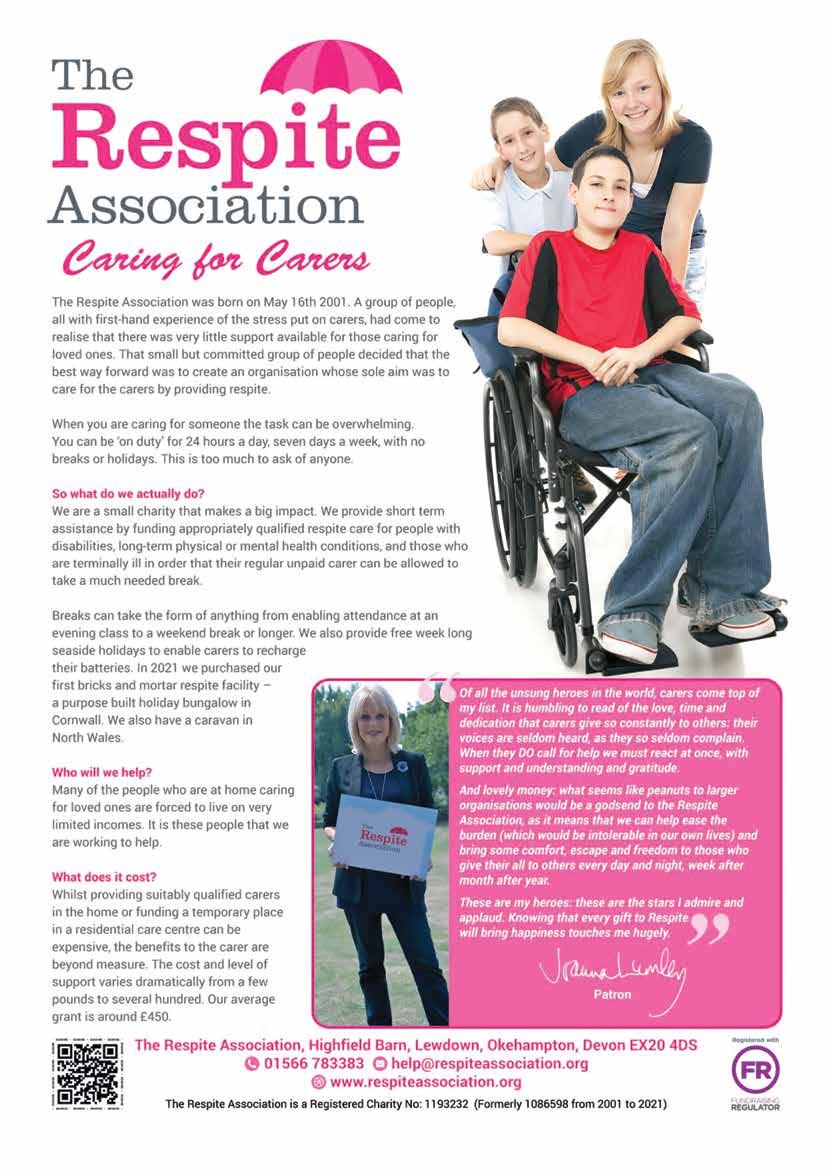

An appreciation by Elizabeth Robson Taylor MA of Richmond Green Chambers and Phillip Taylor MBE, Head of Chambers, Reviews Editor, “The Barrister”, and Mediator.
CHARGING ORDERS ON LAND
Law, Practice and Precedents
Second Edition
Editors: Cecily Crampin and Michael Ransom and members of Falcon Chambers
ISBN 978 0 85490 3 436
WILDY, SIMMONDS & HILL PUBLISHING
www.wildy.com
“Charging Orders on Land” has now arrived as a second edition from Falcon Chambers for 2024 -- an event which will certainly be welcomed by counsel embroiled in the specifics of charging orders, which, more often than not, present special problems.
What we have here is a highly specialised and quite narrow area of law in which attention to minute detail is all too often imperative. The precedents at the back of the book are of great assistance to those involved in drafting orders.
Fortunately for practitioners and judges dealing with the challenge of changing orders, this distinguished text published by Wildy, Simmonds & Hill, presents up to date and authoritative help in what is now regarded as the definitive work on the subject.
Editors Cecily Crampin and Michael Ransom are assisted by nine contributors from Falcon Chambers, known as the set which specialises in land law and landlord and tenant work. Practitioners seeking guidance from this new and updated edition can be confident that they are in good hands. For example, there’s a new chapter on insolvency regimes, plus the inclusion of new CPR procedures and precedents.
This then, is an ample and detailed compendium of practical advice and guidance on ‘the enforcement of money judgements by means of obtaining a charging order.’ Initially, this may sound straightforward, except that all too often it isn’t, as any number of complications can occur within the various stages of enforcement on which there is a special chapter. Also read the chapter on priorities and problems and note the specialist advice on sanctions, tenanted property, overseas entities and much more, including the new chapter on corporate and personal insolvency.
Certainly the book can be depended upon to explain or clarify the various - and seemingly endless - snags and contingencies that frequently occur within this particular category of law, including (probably the most frequent of all) the cases which come under the heading of ‘Personal Circumstances: the family home’ which typically is balanced against the claims of the judgment debtor’s spouse... or possibly former, or divorcing spouse... or ‘any children who live in the property to be shared.’
It is also carefully pointed out that sometimes in such cases, the charging order can be withheld, or the interest of one party, for example, can be transferred to the other. Small wonder then that, in the opinion of quite a few practitioners, the concept of the charging order all too often presents a serious impediment to selling a house and clogging up the already stretched housing market.
Considering the often complicated and sometimes controversial area of law, it is reassuring for the busy practitioners that this comprehensive and carefully researched legal text is easy to navigate. The table of contents is almost minutely detailed, and the extensive appendices offer more than 100 pages of statutory material and precedents -- an invaluable resource which will be of special interest to counsel charged with drafting orders. Also note the tables of cases, statutes, and statutory instruments, plus tables of European conventions and other material.
Any practitioner involved in this highly specialised area will find this comprehensive and carefully researched legal text well-nigh indispensable.
2024..


MIGRANT
HANDBOOK
LEGAL ACTION GROUP The access to justice charity www.lag.org.ukAn indispensable handbook for specialists in immigration law, yet accessible to all interested readers
Is there a new law text out there that is more topical than this?
Not to mention more vital than this? Probably not -- although many may well argue the point. It is indisputable, however, that mass migration, whether legal or illegal, has become an international problem, particularly for the UK -- and in the view of many -- it is a problem that is well-nigh insoluble.
It is fair to say, however, that immigration lawyers in particular -as well as anyone involved in, or committed to, achieving viable solutions to the problems inherent in migrant support -will welcome the publication of this book by the Legal Action Group.
Authors Shu Shin Luh and Connor Johnston have noted that the book (conceived some six years ago) was painstakingly researched and written to ‘replace the irreplaceable’ “Support For Asylum-Seekers” by Sue Willman and Steve Knaffer QC, published by LAG in 2009. It is sobering to recall how much and how quickly and relentlessly the world has changed since then -making the problem of asylum seekers ever more acute.
The publication of this book is therefore all the timelier. And certainly, the almost insoluble complexity of its subject matter is reflected in its more than 1,2000 pages of scholarly and thorough research presented (in the tradition of the LAG) in a clear, accessible style; accessible, that is, not only to lawyers, but to anyone interested in, or involved with, this detailed and certainly controversial and difficult subject, which has occasioned so much debate.
With its focus on the welfare and legal rights of migrants, the book provides in-depth coverage of, for example, housing and welfare, benefits, NHS access and provision and social services, as well as support for failed asylum seekers with reference to special cases; notably unaccompanied children and -most heart-rending of all -- the victims of human trafficking.
This is a handbook you could almost call encyclopaedic. Certainly, it offers specialists in this wide-ranging and many-faceted and complex area of law, a gateway to further research. Note that the first 150 or so pages contain tables of cases... statutes... statutory instruments... immigration rules and a table of European and international legislation. Also, for a volume its size, it is remarkably easy to navigate, containing as it does, copious footnotes, a detailed table of contents and an even more minutely detailed index of at least 115 pages. A handy handbook? Absolutely.
As immigration -- both legal and illegal -- will undoubtedly emerge as a prime issue during elections and beyond, this scholarly yet eminently readable volume will prove indispensable, not only to practitioners, but to anyone interested in the wide-ranging issues inherent in this undeniably difficult area of law.
The date of publication is stated as at December 2023
ISBN 978 1 78742 982 6 www.globelawandbusiness.comCheck out this in-depth analysis of ‘turnaround management’ from Globe
An appreciation by Elizabeth Robson Taylor MA of Richmond Green Chambers and Phillip Taylor MBE, Head of Chambers, Reviews Editor, “The Barrister”, and Mediator
If you are a lawyer with a corporate client -- or clients -- facing financial distress and ultimately insolvency, you need this book, published recently by Globe Law and Business.
Note the usefully descriptive subtitle: ‘Unlocking and Preserving Value in Distressed Businesses’. This says it all, you may say, but as its processes are linked to a complex area of law, there is a lot more to be said, especially when multi-jurisdictional complications emerge.
With lengthy and detailed experience in this specialised area of consultancy, author Alan Tilley provides a broad range of authoritative advice, aimed specifically at those who are confronted with the undeniably challenging task of advising and managing companies teetering on the sharp edge of insolvency, with its intimidating spectrum of possible consequences.
The book and the wealth of advice therein is aimed primarily at those who find themselves in the role of turnaround manager. Such a role, as the author explains ‘usually involves operating in an executive rather than a consultative role’ and as such, ‘exposes the professional to the risks of personal liability.’ You have been warned.
However, no need to despair -- as Tilley adds that operating through a limited liability entity, with a properly constructed engagement contract reduces the risks. Proper professional performance is the ultimate guarantee of risk avoidance.
Anyone in the legal profession or accountancy and/or financial services, might well wonder how this increasingly obvious need for ‘turnaround management’ got started and whether or not it is proving itself effective.
The author’s positive answer is that turnaround management is becoming ‘increasingly recognized as an important part of business’ and that the understanding of its obvious benefits is growing. Tilley is confident that the concept has more than likely evolved as a result of the influence of Chapter 11 of the United States Bankruptcy Code of 1970, which is based on the concept of ‘giving entrepreneurs a second chance’ primarily by creating the concept, so called, of ‘debtor-in-possession’ (DIP) -- usually by means of a restructuring plan while the company is protected from creditors. Better results for shareholders certainly loom large here as a distinct possibility.
Although a complex subject, ‘turnaround management’ is explained in this book with admirable clarity, covering as it does, the risks involved, as well as the potential rewards. Based in the author’s 40-plus years of experience in this field, the consultancy, advice, and guidance contained in this compact volume is highvalue indeed. Note too, the handy appendix which contains over 20 pages of useful guidelines and policy recommendations. With its international orientation, as well as its straightforward advice, this book should be considered as an essential purchase for business and law professionals worldwide.

